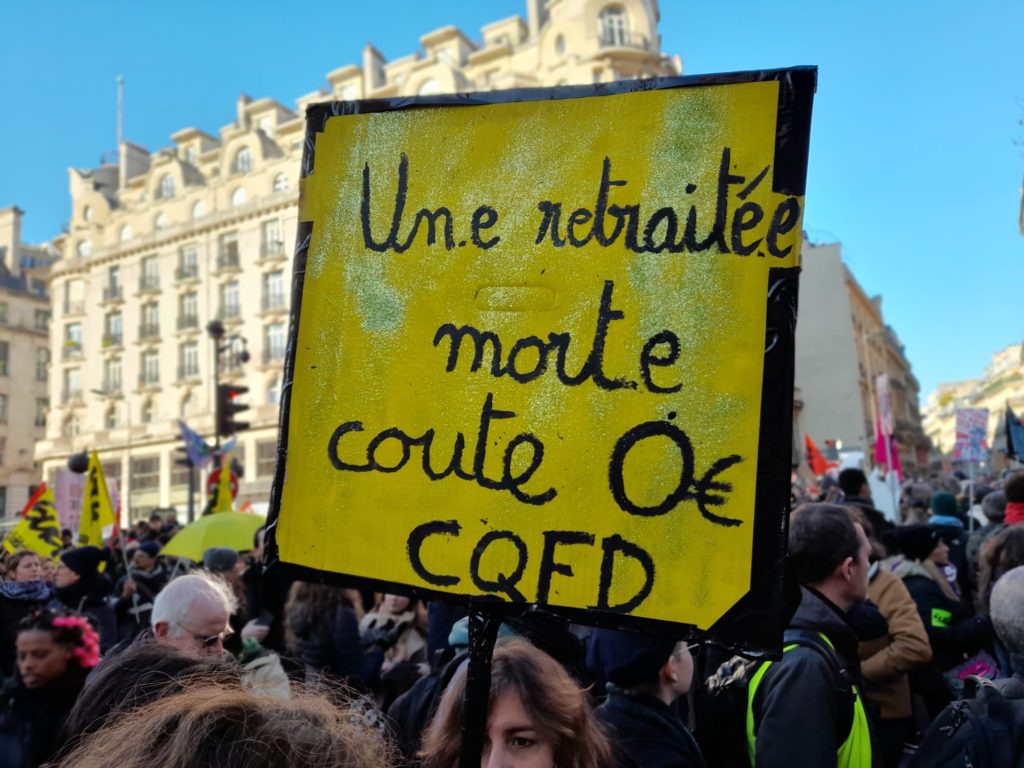El martes 7 de febrero se desarrolló en Francia una nueva jornada de huelga y movilización que volvió a mostrar el rechazo al proyecto de reforma jubilatoria de Macron. Entre 750.000 personas (según la policía) y cerca de dos millones (según la Intersindical) se movilizaron en todo el país. Un tercer round que indica que esta pelea está lejos de terminar.
Por Gustavo Galeota y Tamara Yapura
A partir de la convocatoria unitaria de todas las centrales sindicales (CFDT, CGT, Solidaires, FO, CGE-CGC, CFTC, FSU, Unsa), el martes pasado se movilizaron cientos de miles de trabajadores del sector público y privado, estudiantes de todos los niveles educativos y jubilados. En el caso de París, la marcha fue desde la plaza de la Ópera hasta la plaza de la Bastilla, unos cuatro kilómetros. Así, en la capital y en todas las ciudades las calles fueron otra vez el punto de encuentro de nuestra clase para librar un nuevo round de rechazo masivo al proyecto de ley de reforma jubilatoria.
A pesar de ello, el debate de los grandes medios giró en torno al “debilitamiento” de la huelga y del movimiento. Pero aun reconociendo que existe una merma en la cifra de huelguistas, debido a la desconfianza de las bases en la burocracia de la Intersindical, la jornada masiva demostró que en todo el país hay voluntad de lucha para derrotar la reforma:
– Además del llamado nacional del 7, en departamentos como Sarthe o Dordoña se organizaron al menos cuatro convocatorias más en días distintos y lo mismo en regiones como Normandía y Bretaña.
– La participación también se sostiene en ciudades como Albertville o Pau, consideradas bastiones de la derecha.
– A la sumatoria de las tres marchas realizadas en un período tan corto, menos de 20 días, es solo comparable con hitos históricos como la gran lucha de 1995.

Los líos de Macron, las ganancias capitalistas
La presentación del proyecto de ley de Macron tuvo lugar el lunes 6 de febrero y la Asamblea Nacional tiene como fecha límite para expedirse el próximo 17, para luego pasar a debate en el Senado entre el 17 de febrero y 26 de marzo. Una agenda apurada que demuestra la obstinación presidencial, que bastardea los mecanismos de la propia democracia burguesa y es absolutamente ajena a los debates y preocupaciones del mundo laboral y juvenil.
En el bloque oficialista hay diputados que piden algunos cambios al proyecto y hoy mismo el gobierno tuvo un duro revés parlamentario, cuando en la sesión el oficialismo se retiró del recinto mientras toda la oposición (por izquierda y por derecha) aprobó la renacionalización de EDF, la empresa pública de electricidad.
Es lógico que haya una profunda indignación popular en Francia, cuando a la vez que se pretende hacer trabajar y aportar a la gente más años para cubrir el “déficit” de las cajas jubilatorias, una gran empresa privada como TotalEnergies, que vende gas líquido, hoy acaba de anunciar que el año pasado tuvo ganancias netas récord por 19.500 millones de euros. Como bien se canta en las marchas, “plata hay en la caja patronal”.
Por la huelga general hasta derrotar la reforma
Aunque las convocatorias tienen como consigna principal el rechazo a la reforma jubilatoria, canalizan el fuerte descontento social acumulado durante la crisis, luego agravada por la pandemia y la guerra. Por ejemplo, si bien se habla de un 6% anual de inflación, en algunos alimentos representa un 40%, mientras los salarios siempre quedan retrasados respecto del costo de vida. Por eso, en la marcha del 7, junto al debate sobre cómo continuar la lucha se popularizan consignas como “No al aumento de la edad jubilatoria, Sí al de salarios”.
Este sábado 11 hay una nueva jornada de lucha y la Intersindical ya ha convocado a otra para el jueves 16. En algunos gremios empieza a surgir el planteo de llamar a la huelga general por tiempo indefinido a partir del 7 de marzo. Hace falta impulsar una mayor presión desde abajo, desde cada lugar de trabajo, para obligar a las cúpulas sindicales a endurecer la lucha o para superarlas, porque las calles de Francia confirman que es posible derrotar a Macron y su maldita reforma.




